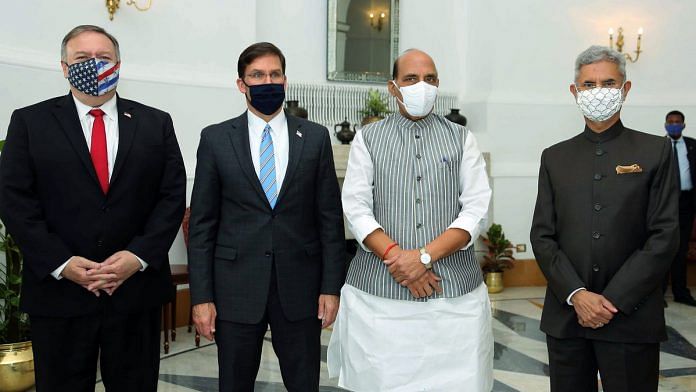New Delhi: When US President Donald Trump fired his Secretary of Defense Mark T. Esper earlier this week, it was just another unceremonious sacking of a top member of his administration in the four years of his presidency.
It is something that doesn’t shock Washington too much, more so considering the Trump administration has only a few months left in office.
But for India, whose ties with the US have been on a consistent upswing, many of these ‘Trump terminations’ have meant a reboot in New Delhi as top Indian ministers and officials had developed a good rapport with those who were shown the door in Washington.
Esper, for one, had visited India just two weeks before he was sacked by Trump through a tweet on Monday. National Counterterrorism Center Director Christopher C. Miller was named the acting Secretary of Defense.
I am pleased to announce that Christopher C. Miller, the highly respected Director of the National Counterterrorism Center (unanimously confirmed by the Senate), will be Acting Secretary of Defense, effective immediately..
— Donald J. Trump (@realDonaldTrump) November 9, 2020
“India-US ties are growing by leaps and bounds. And this is due to the time and energy spent by diplomats on both sides to strengthen bilateral ties. However, the sudden change of key officials creates issues and acts as an impediment for smooth negotiations in important matters,” a top Indian official told ThePrint on the condition of anonymity.
For example, before and during Esper’s visit to India, Defence Minister Rajnath Singh had built a good rapport with him. The ministers were able to conclude a key defence pact based on the understanding they had reached, sources said.
In fact, the sources said, it was due to Singh and Esper’s efforts that the defence pact — the Basic Exchange and Cooperation Agreement (BECA) — was finalised and signed during the 2+2 talks in October. The decision to finalise BECA this time was firmed up when Singh and Esper met for the first time in Washington in 2019, when the much-awaited Industrial Security Annex (ISA) was signed.
Now, India is focusing on establishing a robust relationship with the administration of President-elect Joe Biden, sources said. But it is concerned over the “continuity of talks” concerning security aspects as it begins to strategically align with the US under the ‘Indo-Pacific’ construct, with the objective of containing China, among others.
Also read: Populist leaders such as Modi, Netanyahu, Erdogan may regret their embrace of Trump
The many former top Trump officials
The first Trump firing that caused some disappointment in India was when Rex Tillerson was let go as Secretary of State on 13 March 2018. He was replaced by the incumbent, Mike Pompeo.
Tillerson was the first cabinet official of the Trump administration who was fired on social media. The former Exxon Mobil CEO had built strong ties with India; in fact, during his first meeting with then-external affairs minister Sushma Swaraj in October 2017, Swaraj highlighted that it was due to “personal efforts” that defence engagements between India and the US had intensified.
Then, in December 2018, James Mattis stepped down as Secretary of Defense over “differences” with Trump, though the US President later claimed that the former general was “essentially” fired.
Mattis’ exit came as a major loss for US-India ties — he and Nirmala Sitharaman, then India’s defence minister, bonded over several key issues, particularly India getting a waiver under the Countering America’s Adversaries Through Sanctions Act (CAATSA) for its purchase of S-400 missiles from Russia by writing a letter to the US Congress.
Yet another disappointment for India came when John Bolton, the US National Security Adviser, was sacked by Trump. Bolton, the third NSA under Trump, was fired for differing with the president on matters related to Iran, North Korea and Afghanistan.
Bolton and his Indian counterpart Ajit Doval bonded so deeply that immediately after the 2019 Pulwama terror attack, they held a phone call and discussed Pakistan-based terrorist group Jaish-e-Mohammed (JeM), which was behind the attack.
India’s NSA Doval had also shared cordial ties with Bolton’s predecessor as the US NSA, H.R. McMaster, who left the Trump administration in April 2018.
‘Minor irritation’
Some experts, however, said these changes in personnel are a “minor irritation”, and do not matter much when it comes to decision-making.
Former foreign secretary Kanwal Sibal said, “These changes do not make a big difference at all. Some minor problems can arise, but ultimately, it doesn’t matter, unless there is a major change in policies.”
However, Sibal did add: “It is true that personality matters, and sometimes, it becomes easier to negotiate difficult issues when two individuals bond. But ultimately, decision-making is a composite thing, and every department works together for that. We also have sudden cabinet reshuffles but that does not impact our larger policy-making strategy.”
Also read: India should be relieved Biden won. Modi-Trump bond can only go so far



